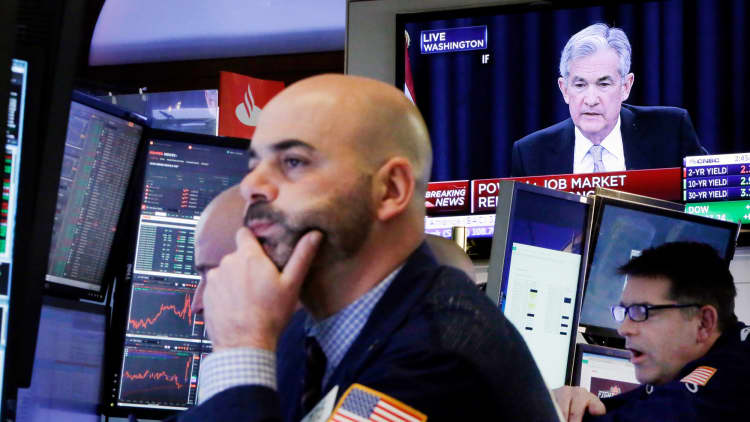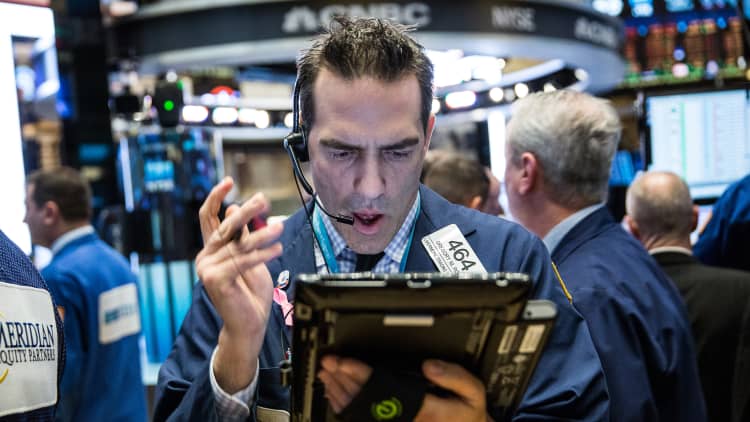
Stocks fell Tuesday after a choppy session as investors grappled with rising U.S. interest rates.
The dipped 0.1 percent to 2,880.34 as a decline in PPG Industries led the materials sector lower. The broad index also closed lower for the fourth straight day.
The Dow Jones Industrial Average closed 56.21 points lower at 26,430.57, with DowDuPont and United Technologies underperforming. The Nasdaq Composite rose slightly to 7,738.02 to snap a three-day losing streak, however, as gains in major tech shares kept losses in check.
Shares of Facebook and Amazon rose 0.4 percent and 0.3 percent, respectively. Netflix gained 1.9 percent. Apple's stock also climbed 1.4 percent.
The major indexes swung between positive and negative territory throughout the day. At its session low, the Dow had fallen 162.62 points and rose as much as 53.16 points. The S&P 500 traded in a 0.8 percent range while the Nasdaq gyrated about 1 percent on the day.
The benchmark 10-year Treasury note yield rose to its highest level since 2011, before slipping. The longer-term 30-year bond yield also reached its highest mark since 2014.
Investors have been fretting over higher interest rates since the release of strong economic data last week. Comments from the top Federal Reserve official also boosted rates. Fed Chairman Jerome Powell said monetary policy was "a long way" from neutral, indicating more rate hikes are coming.
"This has led to a repricing of forward Fed hike expectations," said Katie Nixon, chief investment officer at Northern Trust Wealth Management. "The recent hawkish comments from Powell, as well as the questioning over where the market neutral rate actually is, has led to a bearish tone overall."
"It seems clear that the 'burden of proof' is on the data, and each release will have to be interpreted by investors as either affirming the Feds charted path, or not," said Nixon. "This will mean more volatility in the bond market."
Higher rates and expectations of tighter monetary policy are a drag on stock markets, given that they cap companies' profits, thus restricting possible dividends to investors and higher pay for the employees.
The S&P 500 and the Nasdaq entered Tuesday riding a three-day losing streak, while the Dow posted a small gain in the previous session.

The recent rise in interest rates comes as investors brace for the upcoming earnings season, which starts later this week. J.P. Morgan Chase, Wells Fargo, Citigroup and Walgreens Boots Alliance are among the companies set to report.
Overall, analysts expect corporate earnings to have grown by about 19 percent in the third quarter, according to data from FactSet. Earnings grew by 25 percent in the first two quarters of the year.
"The nervousness surrounding higher interest rates and tariffs should be assuaged by corporate executives not only exceeding an extremely elevated bar of consensus for their bottom line projections but also leaving their forecasts for upcoming periods intact," said Jeremy Klein, chief market strategist at FBN Securities.
However, PPG Industries, an industrial coatings manufacturer, fell more than 10 percent after updating its third-quarter guidance. The company now expects adjusted earnings per share to range between $1.41 and $1.45, well below a FactSet estimate of $1.59.
CEO Michael McGarry said the updated guidance is a result of "significant raw material and elevating logistics cost inflation, including the effects from higher epoxy resin and increasing oil prices," adding: "These inflationary impacts increased during the quarter and, as a result, we experienced the highest level of cost inflation since the cycle began two years ago."
The so-called core PCE price index, which is the Federal Reserve's preferred measure of inflation, remained at 2 percent in August. Two percent is the Fed's inflation target.
—CNBC's Silvia Amaro contributed to this report.


